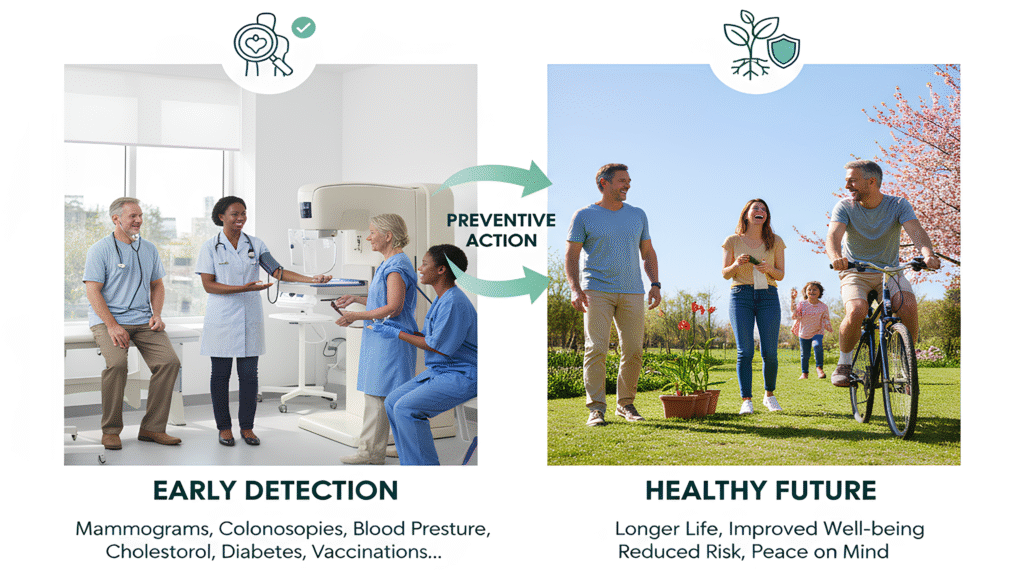Why Talking About Screening Could Be a Life-Saver
Imagine your body as a high-performing car. Even if it’s running smoothly, you still bring it in for oil changes, tire rotations, and tune-ups—because neglecting maintenance almost always leads to bigger, pricier problems later. Our bodies work the same way. Preventive healthcare screenings are essentially those “tune-ups” for our health.
The truth is, disease often whispers before it screams. Many chronic conditions such as diabetes, cancer, and heart disease can develop silently for years. Screenings help spot early warning signs—sometimes before symptoms even begin. Unfortunately, many people skip them because they feel fine, are too busy, or are unsure what they need.
This guide will break everything down. You’ll learn which preventive screenings matter most, when to get them, how they save lives (and wallets), and how to approach them without feeling overwhelmed. By the end, you’ll have a clear, practical roadmap for staying ahead of potential health risks.
What Exactly Are Preventive Health Screenings?
Preventive health screenings are medical tests and check-ups designed to detect potential health problems before they become serious. Instead of waiting until you’re sick, screenings help monitor your health and catch issues early.
Examples include:
- Blood pressure tests to detect hypertension.
- Mammograms for breast cancer detection.
- Cholesterol panels to assess heart disease risk.
- Colonoscopy for colon cancer prevention.
Think of screenings as a compass—they point you toward areas to monitor so you can change course early if needed.
Why Do Preventive Screenings Matter So Much?
1. They Detect Silent Killers Early
Conditions like high blood pressure and diabetes often cause no immediate symptoms. By the time visible signs appear, damage may already be underway.
2. They Save Money in the Long Run
Preventing advanced illnesses reduces the need for costly surgeries, hospitalizations, and long-term medications. A routine cholesterol test costs far less than a heart bypass surgery.
3. They Enhance Quality of Life
Screenings don’t just prolong life—they improve it. Detecting risks early means you can take steps to remain active, independent, and vibrant as you age.
4. They Empower Better Decisions
When you know your health risks, you can tailor your habits: diet, exercise, stress management, and lifestyle changes become targeted and meaningful.
Which Preventive Healthcare Screenings Do Adults Need Most?
Different ages bring different priorities. Below is a practical guide based on standard recommendations (always personalized by your doctor).
Screenings for All Adults
- Blood Pressure Check: At least every 1–2 years.
- Cholesterol Test: Every 4–6 years, earlier/more often if high risk.
- Blood Sugar / Diabetes Screening: Every 3 years starting at age 35, sooner if overweight.
- Body Mass Index (BMI) & Weight Check: Annually.
Screenings for Women
- Pap Smear / HPV Test: Ages 21–65 (interval depends on test type).
- Mammogram: Every 1–2 years starting at age 40–50 depending on risk and guidelines.
- Bone Density Test: Starting at 65 (earlier if at risk).
Screenings for Men
- Prostate Cancer (PSA Test): Discuss individually starting at 50 (earlier if high risk).
- Abdominal Aortic Aneurysm Ultrasound: Men 65–75 who smoked.
Screenings for Adults 50+
- Colonoscopy: Every 10 years starting at age 45–50, earlier with family history.
- Vision & Hearing Tests: Every 1–2 years.
- Skin Cancer Screenings: Especially for light-skinned individuals or those with high sun exposure.
How Do You Know Which Screenings You Personally Need?
- Start With Your Family History
If heart disease, cancer, or diabetes runs in your family, your doctor may recommend earlier or more frequent testing. - Review Your Lifestyle
Smoking, alcohol consumption, diet, and exercise directly influence screening schedules. - Have an Annual Primary Care Visit
Annual checkups are like the hub of a wheel, where personalized preventive care plans are designed. - Use Preventive Care Guidelines
Resources like the U.S. Preventive Services Task Force (USPSTF) update recommendations based on age and risk.
What Happens If You Skip Preventive Screenings?
Skipping screenings is like driving without a seatbelt—sometimes you’ll get away with it, but the risk is enormous if danger strikes.
Possible consequences of skipping screenings include:
- Cancers progressing undetected until harder to treat.
- Heart disease discovered only after a heart attack.
- Diabetes diagnosed only after organ damage has begun.
- Missed opportunities for lifestyle changes that could prevent long-term illness.
In short, skipping screenings doesn’t just gamble with years of your life—it gambles with the quality of those years, too.
Common Myths About Preventive Screenings
“I feel fine, so I don’t need checkups.”
False. Many chronic illnesses start silently.
“Screenings are too expensive.”
Most preventive services are covered 100% under health insurance. Without insurance, individual tests are often cheaper than disease treatment.
“Screenings always overdiagnose.”
While no system is perfect, guidelines are designed to avoid unnecessary testing while maximizing lifesaving benefits.
Step-by-Step: How to Approach Preventive Screenings Without Stress
- Collect Basic Information
Write down family medical history, current medications, allergies, lifestyle habits. - Schedule a Primary Care Visit
Let your provider map a personalized screening plan. - Prepare for Appointments
– Wear practical clothing.
– Bring recent test results.
– Prepare questions. - Follow Up
Even if results are normal, keep them for future comparison. Consistency is key. - Integrate Lifestyle Care
Screenings work best when combined with healthy daily habits (nutrition, movement, stress management).
Comparison Table: Common Screenings by Age Group
| Screening | 20s–30s | 40s–50s | 60+ |
|---|---|---|---|
| Blood Pressure | Every 1–2 yrs | Annually | Annually |
| Cholesterol | Every 4–6 yrs | Every 2–4 yrs | Every 2 yrs |
| Blood Sugar | Risk-based | Every 3 yrs | Every 1–3 yrs |
| Pap Smear / HPV | Every 3–5 yrs | Until 65 | Usually stopped |
| Mammogram | Risk-based | Every 1–2 yrs | Every 1–2 yrs |
| Colonoscopy | – | Start 45–50 | Every 10 yrs |
| Bone Density | – | Risk-based | Every 2 yrs |
| Vision/Hearing | Risk-based | Every 2 yrs | Annual |
FAQs: Preventive Healthcare Screenings
Q1: What’s the difference between preventive screenings and regular checkups?
Preventive screenings are specific tests for detecting disease risks, while checkups are broader visits that may include screenings, physical exams, and overall health discussions.
Q2: Are preventive screenings covered by insurance?
Yes, under the Affordable Care Act, most screenings are fully covered when done at recommended intervals.
Q3: Do I need screenings if I’m under 30?
Yes, starting small with blood pressure, cholesterol, and Pap smears (for women) builds a foundation for lifelong health.
Q4: How do screenings differ for high-risk people?
If you have a family history, smoke, or have existing conditions, screening may start earlier and occur more frequently.
Q5: Can lifestyle changes reduce the need for screenings?
Healthy lifestyle reduces risk, but screenings are still needed. Even the healthiest person can have hidden conditions.
Final Thoughts: Prevention is the Best Prescription
Preventive healthcare screenings are not about paranoia—they’re about preparation. They’re the guardrails that keep your health journey safely on track, helping you avoid the stress, cost, and pain of late-stage disease. Think of them as an investment: a small amount of time now for a future filled with energy, vitality, and peace of mind.
Consider this your invitation to take action: schedule that overdue checkup, ask your doctor about screenings you might need, and share this guide with someone you love. Prevention is powerful—but only if we actually use it.

